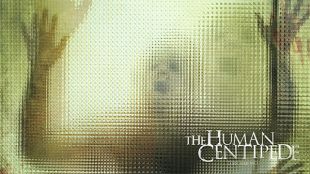Viciously lean and inventively mean, Tom Six's high-concept horror outing The Human Centipede infuses the traditional teens-lost-in-the-woods plotline with a refreshingly sick twist that effectively reinvigorates the well-worn genre trope. But The Human Centipede has much more going for it than a demented conceit alone; it's a meticulously crafted take on the mad scientist subgenre that methodically burrows its way into the darkest corners of our subconscious by being entirely clinical about its malevolent intentions, then lurching into uncharted territory as we nervously wonder to ourselves just how far Mr. Six and company plan on taking things.
Young Americans Lindsay (Ashley C. Williams) and Jenny (Ashlynn Yennie) are driving though the European countryside when their tire suddenly blows out, leaving them both stranded in the middle of nowhere. With no cell phone service and bad weather fast approaching, the girls decide to try their luck on foot, eventually stumbling across an ultra-modern house inhabited by the misanthropic Dr. Heiter (Dieter Laser). A retired surgeon who specialized in the separation of conjoined twins, Dr. Heiter has recently begun experimenting with a radical new form of surgery in his basement operating room. These days, instead of separating his patients, Dr. Heiter is connecting them by attaching the gastrointestinal system of one creature to another to create a kind of living chain. His first experiment, the "three-dog" was such a success that Dr. Heiter is looking to try out the operation on some human subjects. When Lindsay and Jenny show up on his doorstep, Dr. Heiter begins prepping for surgery.
Few films have the power to polarize viewers at the mere mention of the concept alone, so it's a testament to Six's warped sensibilities that The Human Centipede fully delivers on the promise of its evocative title and then some. In the post-Saw and Hostel world of horror, it's difficult to shock viewers accustomed to seeing the human body desecrated in just about every method imaginable. Six, however, seems to relish the opportunity to prove that there are always darker horizons in the realms of the unknown, instilling his film with an element of danger by revealing his concept at the onset, then subtly shifting focus before methodically working back up to the human experiment. In doing so, Six creates an air of dread that grows more intense with each passing scene; we know what is going to happen to his patients -- even down to the most minute details, thanks to a chilling speech in which the maniacal surgeon explains the operation in vivid detail -- just not exactly how and when.
By giving Dr. Heiter the chance to revel in his godlike powers, Six offers star Laser the opportunity to explore the deepest reaches of his character's twisted psyche, and together the pair create one of the most memorable horror villains in recent years -- a modern-day Dr. Frankenstein whose indifference to human suffering permits him to create a man-made abomination with such cold, calculated efficiency that all he can do is marvel at his own work as the tortured cries of his agonized subjects pierce the still country air. And Laser couldn't be more physically suited for the gig; with a fiery gaze, pointy-tipped ears, and a protruding jaw perched precariously atop a thin, sinewy neck, the aged actor takes on the appearance of Udo Kier and Christopher Walken's satanic love child. His scowl is the stuff of nightmares, and his smile is even worse. Like the most iconic horror villains, Dr. Heiter is evil personified, and Laser commands the role with such cold assurance that moviegoers are likely to be shrinking away from his image for years to come.
The film itself is an interesting beast, too; the stark cinematography, deliberate pacing, and blunt dialogue all display a distinctly Japanese sensibility. In filtering those factors though a Dutch perspective, setting the action in Europe, and presenting dialogue in English, German, and Japanese, the film takes on a vaguely international air that expands both the mystery and the menace. But while some viewers will likely begin drawing parallels to Hostel and other entries in the torture porn canon, The Human Centipede doesn't easily fit into such a tidy critical catchphrase; Six seems more interested in keeping the focus on our dreaded antagonist rather than lingering on the suffering of his "patients" once the action gets under way. As a result, the film becomes something of a macabre character study of an unhinged narcissist who gets off on playing God. By having Dr. Heiter become locked in a struggle with his creation in the film's final act, we are once again drawn back to the classic Frankenstein model. So while The Human Centipede may be a child of the torture porn generation -- there's no question that a certain amount of suffering is on display -- it also exhibits the qualities of a traditional monster movie born of a truly grotesque concept.
Of course, that minor yet crucial distinction may not go far in convincing most easily offended movie fans that they should subject themselves to such an abhorrent spectacle. It does, on the other hand, offer proof that Six isn't simply interested in riding the coattails of a sadistic trend, but instead merging traditional horror elements with imaginative new methods of making an audience squirm.
